Reincarnating India's waste
Critics say India has become the developed world's dumping ground, rapidly poisoning itself and its billion-plus people with toxins from both the waste and the pollution from the sometimes dangerous methods used to recycle it. Every year, India imports millions of tonnes of plastic, steel, other metals and discarded computers to break down and recycle or re-use, often with unskilled workers ignorant of the risks. Large and medium scale industrial recycling accounts for less than half India's total recycling. The rest is done through kabadiwallahs, India's army of worker ants -men, women and children- who stream out of their cardboard slums each dawn to scour the gutters and streets for useful trash, from foil medicine packets to rags, plastic bags, glass and iron. The trash is brought back to the slum where, among huts made of cardboard and plastic sheeting and lanes lined by black rivulets of sewage, it is sorted, weighed and packed to await buyers from recycling factories.

A group of boys sort out plastic waste before it is sold to a recycling unit. New Delhi, 2007

A waste picker sorts out his catch of the day before he weights it and sells it to the waste dealer. Waste pickers remove 10 to 15% of municipal waste, recovering more than 1000 tones of recyclables, which helps to run over 1000 recycling units. A small waste dealer buys waste from 20 to 25 waste pickers. Waste pickers work in the most unhygienic condition with at least 30% getting injuries from different kind of sharps, some of htem highly infectious. New Delhi, 2007
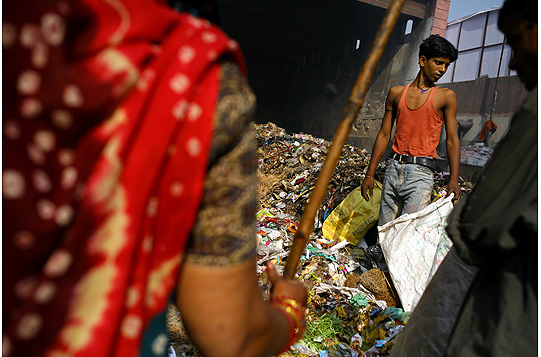
Waste pickers work in a dumpster in the early morning looking for anything -plastic, glass, garments, etc.- that they can later sell to the waste dealers. Most waste pickers are migrants from rural India who worked as sharecropper farmers or on some other manual employement with very low cash wages. They come to the cities in search of a better life and find themselves with no other option but to work in dumpsters all day long. Waste pickers work in the most unhygienic condition with at least 30% getting injuries from different kind of sharps, some of them highly infectious. New Delhi, 2007

A man works on long pieces of iron that will be reused in the construction business. New Delhi, 2007

A boy weights a few metal nails that he has collected in a construction site nearby, hoping to make a few rupees for his family. There is a system of patronage existing between waste pickers and waste dealers, in the form of lending money, providing shelter, etc. A small waste dealer buys waste from 20 to 25 waste pickers. There are around 50.000 child waste pickers in Delhi alone. New Delhi, 2007
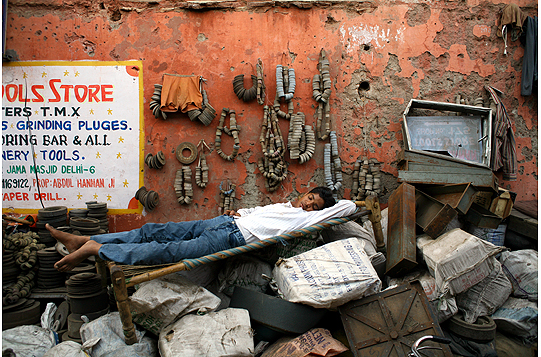
A young man rests in a waste market. New Delhi, 2007
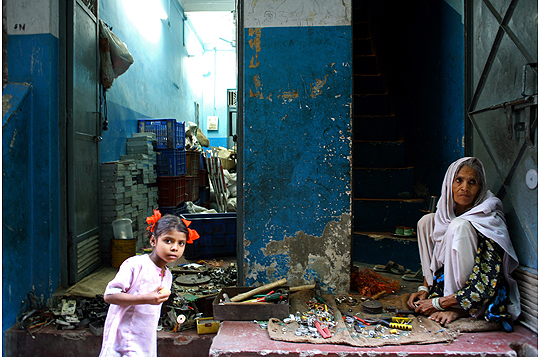
An old woman sorts out computer hardware that has been dismantled, before it is all sold to recycling units outside the city. Some families run these businesses in areas where it is illegal to do so. New Delhi, 2007
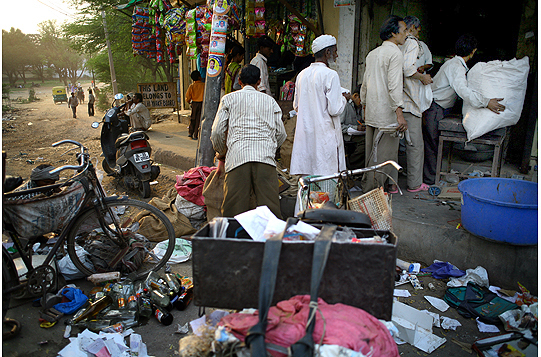
Waste pickers line up in front of a waste dealer shop to weight their catch and get paid for it. Waste pickers remove 10 to 15% of municipal waste, recovering more than 1000 tones of recyclables, which helps to run over 1000 recycling units. A small waste dealer buys waste from 20 to 25 waste pickers. New Delhi, 2007
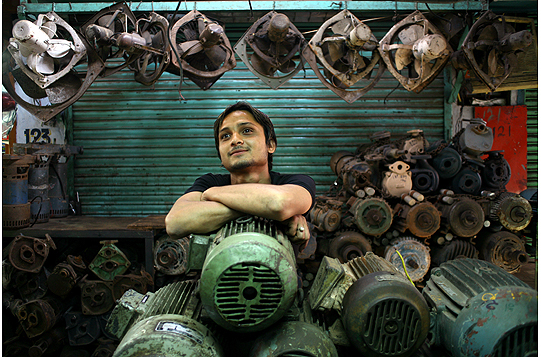
Market scene in a waste market that specialices in boat engines. New Delhi, 2007
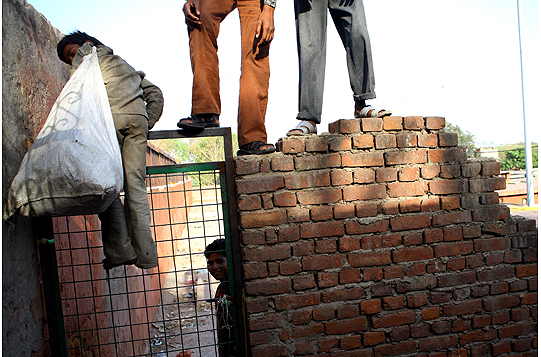
A group of children are on their way to the waste dealer to sell the waste they have been picking throughout the day. Waste pickers work in the most unhygienic condition with at least 30% getting injuries from different kind of sharps, some of htem highly infectious. There are around 50.000 child waste pickers in Delhi alone. New Delhi, 2007
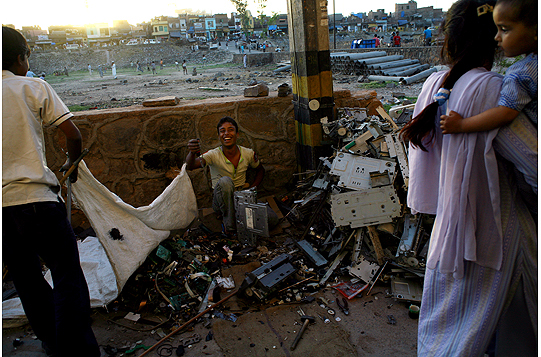
Dismantling business are usually carried on in the street where life continues at its own pace. New Delhi, 2007

A young man dismantles electronic before all parts are sent to the recycling units outside Delhi. New Delhi, 2007
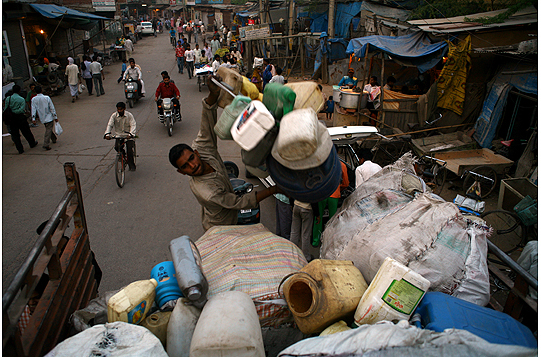
Random waste being loaded on a truck, which will later be taken to a recycling company. New Delhi, 2007

Computer waste is loaded on a truck that will take it to a recycling company in the outskirts of Delhi. New Delhi, 2007
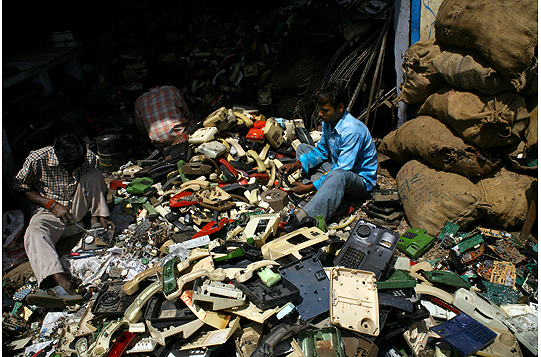
Young men dismantle telephone units for recycling. New Delhi, 2007
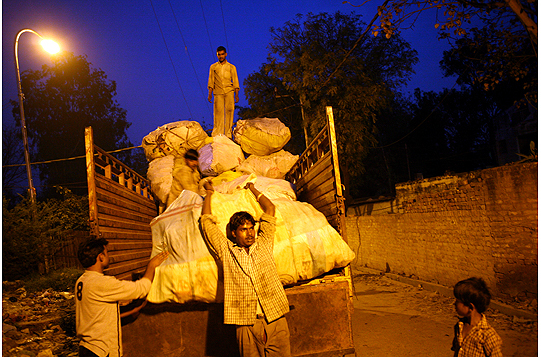
Waste sorterers download a truck full of waste, which will rest in the storage area where waste is sorted out and put in bags, the last process before it is sold to the recycling units. New Delhi, 2007

A portrait of a man working in the biggest waste market in Asia. New Delhi, 2007
